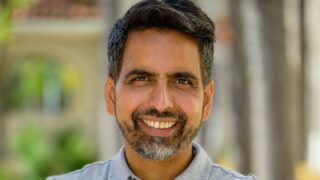The Lavin Agency Speakers Bureau
A speakers bureau that represents the best original thinkers,
writers, and doers for speaking engagements.
A speakers bureau that represents the best original thinkers,
writers, and doers for speaking engagements.
Poverty and equality shape not just how students get to college, but how they make it through.
Elite colleges are accepting diverse and disadvantaged students more than ever before—but to Anthony Jack, access does not equal acceptance. As author of The Privileged Poor and the forthcoming Class Dismissed, Jack—once a low-income, first-generation college student himself—studies how poor students are often failed by the top schools that admit them. He’s also the faculty director of Boston University’s Newbury Center, which serves first-generation students and focuses on student success and inclusion. In talks, he details how class divides on campus create barriers to academic success—and shares what schools can do to truly level the playing field. “When you address the inequalities that disproportionately fall on the shoulders of first-generation and low-income college students,” he says, “you make the university better for all students.”
Anthony Jack is transforming the way we address diversity and inclusion in education. He’s an associate professor of higher education leadership at Boston University, and faculty director of BU’s Newbury Center, where he works to increase understanding and equity around first-generation students on campus.
His widely acclaimed book, The Privileged Poor: How Elite Colleges are Failing Disadvantaged Students, reframes the conversation surrounding poverty and higher education. In it, he explains the paths of two uniquely segregated groups. First, the “privileged poor”: students from low-income, diverse backgrounds who attended elite prep or boarding school before attending college. The second are what Jack calls the “doubly disadvantaged”—students who arrive from underprivileged backgrounds without prep or boarding school to soften their college transition. Although both groups come from economically disadvantaged backgrounds, the privileged poor have more cultural capital to navigate and succeed—in the college environment and beyond.
“The lasting beauty of Jack’s ethnography is that it gives a voice to the students who, as his research ends up revealing, most need it.”— The New Yorker
“It’s one thing to graduate with a degree from an elite institution, and another thing to graduate with the social capital to activate that degree,” Jack explains. In many ways, rather than close the wealth gap, campus culture at elite schools further alienate poor students by making them feel like they don’t belong. To challenge these deeply ingrained social, cultural, and economic disparities on campus, we must first begin to question what we take for granted. Jack reveals how organizations—from administrators and association organizers, to educators and student activists—can ask the right questions and bridge the gap.
In addition to The Privileged Poor, Jack is the author of the forthcoming Class Dismissed: When Colleges Ignore Inequality and Students Pay the Price. He explores why colleges were so unprepared to support their most vulnerable students when racial unrest and a global health crisis gripped the world, and more importantly, how we can move forward. His research has been cited by The New York Times, the Boston Globe, The Atlantic, The Huffington Post, The National Review, The Washington Post, American RadioWorks, WBUR, and MPR. His book, The Privileged Poor, was named the 2018 recipient of the Thomas J. Wilson Memorial Prize by Harvard University Press.
We really enjoyed Tony and thought he did a great job. All the feedback we got was really positive. I think his approach to inclusiveness was just what our organization was looking for and he was very authentic and genuine in his delivery.
PDC Energy
#1 New York Times Bestselling Author of How the Word Is Passed and Above Ground Atlantic Staff Writer

Founder and Chief Executive Officer of Khan Academy
Expert in the psychology of persistence Assistant professor of developmental psychology at University of Texas, Austin

Author of Indivisible: How to Forge Our Differences into a Stronger Future Founder and CEO of WatchHerWork

Author of The 272: The Families who Were Enslaved and Sold to Build the American Catholic Church Associate Professor at New York University Former New York Times Johannesburg Bureau Chief

Author of The State Must Provide: The Definitive History of Racial Inequality in American Higher Education Staff Writer at The Atlantic

First Deputy National Cyber Director for Technology and Ecosystem Security Former White House AI Council Member Former Google Global Head of Product Security Strategy

Author of Jerks at Work and Job Therapy NYU Professor of Psychology

Founder of Vision & Justice Harvard Associate Professor Author of The Rise and The Unseen Truth

Author of Grit, the #1 New York Times Bestseller | Pioneering Researcher on Grit, Perseverance, and the Science of Success

Pulitzer Prize-Winning Creator of The 1619 Project | Executive Producer of the Emmy Award-Winning 1619 Project Hulu Docuseries | MacArthur Genius
Nike's Former Chief Marketing Officer | Author of Emotion by Design

New York Times Bestselling Author Of All Boys Aren’t Blue and We Are Not Broken | Emmy Nominee | LGBTQIA+ Activist
CEO of The Atlantic | Former Editor-in-Chief of WIRED

What does it mean to be a poor student on a rich campus? This question is all the more important as colleges and universities continue to take affirmative steps to socioeconomically diversify their campuses. In this talk, Anthony Jack examines how class and culture shape how undergraduates navigate college by exploring the “experiential core of college life,” those too often overlooked moments between getting in and graduating.
Here, he sheds new light on how inequality is reproduced by contrasting the experiences of the Privileged Poor—lower-income students who graduate from boarding, day, and preparatory high schools—and the Doubly Disadvantaged—lower-income undergraduates who graduate from public, typically distressed high schools. Drawing on interviews with 103 undergraduates and two years of observing everyday life at an elite university, Jack interrogates the social and personal costs of exclusion that have implications for undergraduates’ objective opportunities and their social well-being.

How do you and your company think about diversity recruitment and, equally important, the question of retention? What are you looking for when you screen appicants? In this talk, Anthony Jack helps corporate audiences understand not only what happens to students on campus before they submit their resumes and cover letters to employers, but also the larger social inequalities that make them look different from their wealthier applicants. Jack shows that in the same way that schools must look at how students don’t simply assimilate at the moment of entry, companies must also examine taken-for-granted policies that privilege those from money, and place undue burdens on employees from nontraditional backgrounds.

Elite colleges are accepting a more diverse student body than ever before. But when racial unrest and a global health crisis gripped the world, schools scrambled to figure out the needs of their new student body—and disadvantaged students paid the price. In this talk, Anthony Jack, author of The Privileged Poor, explores why colleges were so unprepared to support their most vulnerable students, and more importantly, how we can move forward.
Drawing on his rigorous reporting to give real-life examples of students, such as lower-income students whose valuable work experience is often overlooked on resumes. He challenges the myth of the “college bubble,” illustrating how lower-income students bring the inequalities of their neighborhoods right onto campus. His critical analysis offers a clear path to creating a fairer educational system. Through simple but strategic steps—like revamping how we review resumes or offering learning opportunities outside of the classroom—we can ensure a more equitable experience for disadvantaged students.
Anthony’s eye-opening talk makes one thing clear: creating a diverse workforce begins with transforming our colleges. Now is the time to overhaul our education systems and pave the way for a better future for all students.